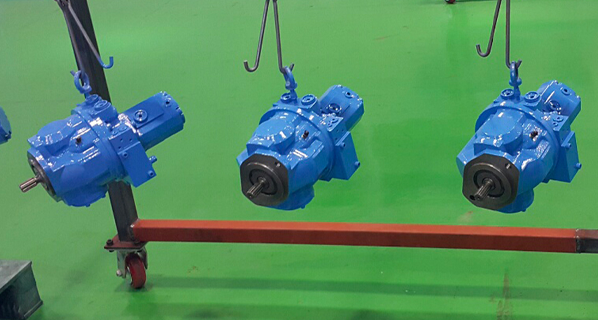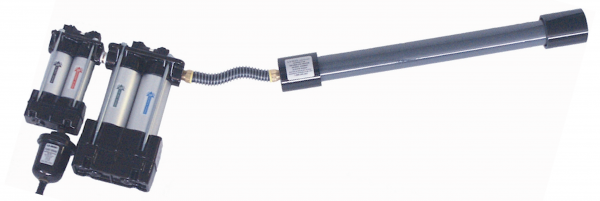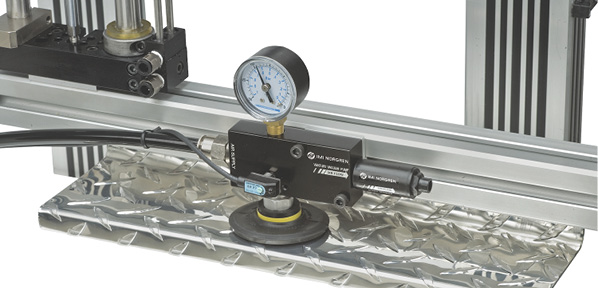Choosing an Excavator’s Hydraulic Pump

By Ikrom Kurbanov, General Manager, Hydraulic America.
Excavators are heavy-duty machines commonly used in construction, mining, and other industries to dig and move large amounts of earth and other material. An excavator’s hydraulic system is critical for its performance and efficiency, and one of its critical components is the pump. Choosing the right hydraulic pump is essential to ensure the excavator’s performance and efficiency. In this article, we discuss the importance of choosing the right hydraulic pump for an excavator and the best components for a specific application.
The hydraulic pump is responsible for providing the necessary flow and pressure of the hydraulic fluid to the motors and cylinders. It is the heart of the excavator’s hydraulic system. The flow and pressure of the hydraulic fluid are important for the excavator’s performance and efficiency. Different types of pumps can affect the flow and pressure of the hydraulic fluid, which affects the excavator’s performance and efficiency.
When choosing the right pump for an excavator’s hydraulic system, it is essential to consider the machine’s application and requirements. Factors such as the type of material to be excavated, the depth and size of the excavation, and the machine’s operating conditions should be taken into account.
Types of pumps
When it comes to hydraulic pumps, there are three main types: gear, vane, and piston. Each has pros and cons to understand when making a decision.
- Gear pumps are known for their high volumetric efficiency and low noise levels. They are also relatively inexpensive and easy to maintain. However, they are not suitable for high-pressure applications, and their performance can be affected by contamination and wear.
- Vane pumps offer smooth operation and high-pressure capabilities. They are also relatively easy to maintain and handle a wide range of viscosities. However, they are not as efficient as gear pumps, and their performance can be affected by contamination and wear.
- Piston pumps are known for their high-pressure capabilities, high efficiency, and durability. Like vane pumps, they are easy to maintain and handle a range of viscosities. But they are more expensive than gear and vane pumps and can be sensitive to contamination.
When it comes to excavator hydraulic systems, piston pumps are the preferred choice because they can handle high-pressure applications and are highly efficient and durable. Additionally, they handle a wide range of viscosities, better than its counterparts.
Piston pump designs for excavators from one to 10 tens – including Kayaba PSVD Series, Nachi PHK and PVD Series, Kawasaki K3SPSeries, and Rexroth-Uchida type AP2D – deserve consideration.
Rexroth-Uchida type AP2D pumps are a type commonly used in excavators and other heavy-duty machinery. The pumps are known for high performance and efficiency, and offer a number of advantages over other types of pumps. One of the main ones is their high-pressure capabilities. These pumps are able to generate pressures up to 42 Mpa (6.091 psi), which is much higher than other types of pumps. This high-pressure capability makes them suitable for working in extreme conditions in a range of applications.
Another advantage of Rexroth-Uchida type AP2D pumps is their high efficiency. They have a volumetric efficiency of up to 98%. This high efficiency means that less energy is required to operate the pump, resulting in lower fuel consumption and operating costs.
Overall, Rexroth-Uchida type AP2D pumps offer a number of advantages over other types. Their high-pressure capabilities, high efficiency, durability, and reliability make them suitable for heavy-duty machinery applications, including excavators.
AP2D is a single pump but is designed to act and perform as a double pump. In short, you can have a compact main pump with extraordinary performance. Also, they come in various discharge rates of 10cc/rev 12 cc/rev, 14 cc/rev, 18 cc/rev, 21 cc/rev, 25 cc/rev, 28 cc/rev and 36 cc/rev, making them an ideal choice for mini and midi excavators.
For excavators of 10 tons or more, the best choice is the Kawasaki K3V and K5V series. Kawasaki has perfected the design of K3V double pumps over a decade and upgraded its pumps to newer K5V and K7V series (K7V series are newest addition, and it is yet to prove itself in the market). Just like AP2D, K3V and K5V come with a range of displacements, starting from 63 cc/rev for 10-ton class excavators up to 280cc/rev for the 50-ton class. Other characteristics make the K3V and K5V stand out.
- High efficiency. The pumps have high volumetric efficiency and can pump a large amount of fluid with minimal energy consumption.
- Compact design. The pumps are designed to be compact and lightweight, making them ideal for use in mobile equipment and other applications where space is limited.
- Long service life. The pumps are built with high-quality materials and are designed to withstand harsh operating conditions, which results in a long service life.
- High-pressure capabilities. The K3V and K5V pumps can handle high pressure, making them suitable for use in a wide range of applications.
- Low noise level. These pumps operate with minimal noise, ideal for noise-sensitive environments.
- Easy maintenance. The pumps are designed for easy maintenance and can be easily disassembled for cleaning or repairs.
- Versatility. The K3V and K5V pumps are used in applications including construction, mining, agriculture, and more.
Open or closed loop?
Another aspect to consider when choosing a pump for an excavator’s hydraulic system is the type of system. There are two types used in excavators: open loop and closed loop.
An open loop system in an excavator consists of a pump, motors (final drives and swing), cylinders, and a tank. The fluid is pumped out of the tank, through the motors and cylinders, and back into the tank. This simple system is inexpensive and the most commonly used one in excavators.
A closed loop system, on the other hand, uses a pump, motor, heat exchanger, and a filter to control the fluid temperature and pressure. This system is more complex and expensive, but it provides better control of the fluid temperature and pressure, resulting in better performance and efficiency.
Overall, it is important to choose the right pump for an excavator’s hydraulic system. Piston pumps are the preferred choice because of their high-pressure capabilities, high efficiency, and durability. Additionally, most excavator manufacturers use open loop hydraulic systems, which perform well with piston pumps.
Overall, it is important to choose the right pump for an excavator’s hydraulic system. Piston pumps are the preferred choice because of their high-pressure capabilities, high efficiency, and durability. Most excavator manufacturers use open loop hydraulic systems, which perform well with piston pumps.
Always consult with experts to ensure you choose the right pump for your excavator.
For more information, visit https://shophydraulicamerica.com.







